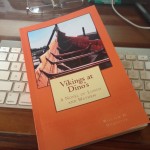 The delightful Outwitting History
The delightful Outwitting History is the story of Aaron Lansky’s seemingly quixotic but ultimately successful attempt to rescue an entire body of literature: the vast body of works written in Yiddish that were in danger of being simply thrown away in last part of the 20th century.
The Jews have always been people of the Book, have always been literate; and starting in the mid-19th century the language in which European Jews wrote books (and especially secular books) was Yiddish. This continued up through the founding of Israel and then World War II; and then the Israelis chose to emphasize Hebrew and actively began to forget Yiddish. In the United States and other countries where assimilation was the rule, children were raised speaking the local vernacular; only their parents remembered Yiddish and could read the old books. And as time went on and the parents died, the books remained, unread.
And then Lansky came calling. When he started, it was estimated that there might be something like 700,000 books to be rescued in all the world; in the end, with help from a great many people (including Arlo Guthrie’s mother and Steven Spielberg) he recovered millions. And all of those books have been digitized and are on-line at Lansky’s Yiddish Book Center, the first literature to be digitized in its entirety.
Now me, I have no knowledge of Yiddish, and no interesting in learning it; I will never read these books. But I have to say, Lansky is a born teller of tales; this is simply one of the funniest, most compulsively readable non-fiction books I’ve run across, and I recommend it highly.
Some highlights:
- Lansky’s discovery that when collecting books it takes three: two to schlep boxes and one to schmooze and eat with the person giving them. You always had to schmooze because they always wanted to talk about the books they were giving away, and they wanted to be sure that Lansky understood how much they loved them. And you always had to eat, because they insisted. And you had to have three people, because one person simply couldn’t eat that much over a day’s worth of visits.
- The Hasidic bookstore that had a vast collection of Yiddish books that people had contributed as their parents died, that they would by no means sell or give away: Yiddish books were secular, and hence suspect, and they could not be responsible for leading anyone astray by making them available. But on the other hand they were books, and couldn’t simply be destroyed. So they sat in the attic and gathered dust, and Lansky was never able to get them.
- The old folks keeping the torch alive at various Yiddish-language magazines and newspapers, each dedicated to a particular cause and political slant, all of whom knew each other and none of whom would talk to each other anymore.
- And always, the talking, the noshing, the passion, the love of the printed word. Warmed my heart, it did.
Anyway, go find a copy. You’ll find yourself reading bits of it to your loved ones, see if you don’t.












